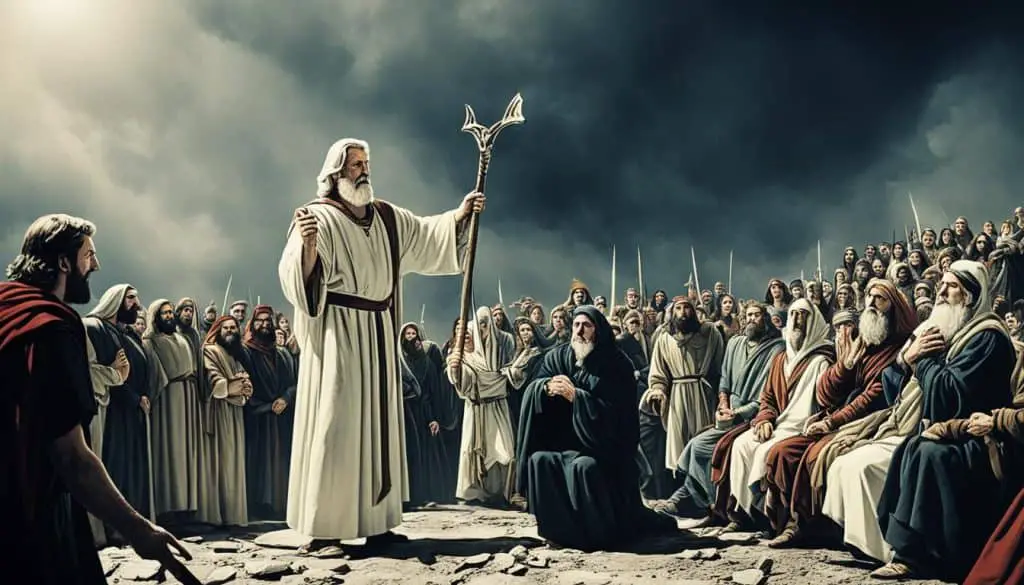Table of Contents
Miracles usually mean blessings, right? Not always. Sometimes, miracles lead to judgment. We’ll look at five Bible events where miracles did just that. They challenge what we often think and make us think deeply.
We’re exploring events like Noah’s Ark, Sodom and Gomorrah, and Egypt’s plagues. Each story shows miracles bringing judgment. They teach us important lessons.
Get ready to be fascinated. We’ll uncover what these amazing stories tell us. And we’ll see how their lessons apply to our lives.
The Flood and Noah’s Ark (Genesis 6-8)
The story of Noah and the flood talks about divine judgment in the Bible. It tells us how the world was full of corruption and God decided to clean it with a big flood. This flood was needed to deal with the wickedness everywhere.
Noah was a good man who followed God’s ways. So, God saved him and his family from the flood in an ark. This ark, known as Noah’s Ark, was a sign of hope and safety during the disaster.
When the flood came, it destroyed everything outside the ark. This event was not just about destruction. It was also a chance for a new start. It gave people a chance to rebuild and live better lives.
Thinking about Noah’s Ark helps us understand the value of living right in a world filled with wrong. We learn the importance of being loyal and true to good values, even when it’s tough.
The Covenant of the Rainbow
After the water went down, Noah and his family came out to a new world. God made a promise with Noah, showing it with a rainbow in the sky. This promise was that God would not flood the earth again.
“I have set my bow in the cloud, and it shall be a token of a covenant between me and the earth.” – Genesis 9:13
The rainbow is a sign of God’s love and kindness. It stands for hope and God’s promise to stay true. Noah’s story teaches us that even after tough times, God offers a way to start fresh.
| Noah’s Ark | The Flood |
|---|---|
| Noah and his family found favor with God. | The floodwaters cleansed the world of corruption. |
| The ark served as a means of salvation. | Only those onboard the ark were spared from destruction. |
| The ark symbolizes hope and new beginnings. | The flood paved the way for a fresh start. |
| The rainbow represents God’s covenant and faithfulness. | God promised never to destroy the earth with a flood again. |
Reflecting on Noah’s Ark, we learn a lesson in living right and being obedient, no matter what. The story of the rainbow tells us about hope and God’s loyalty. Just like Noah was favored by God, we should aim to live well and faithfully in our world.
Sodom and Gomorrah’s Fiery End (Genesis 19)
Sodom and Gomorrah were known for their great sinfulness. The people there had forgotten about living a good life and were facing God’s punishment. These cities were about to be destroyed by fire from heaven.
“And the Lord rained upon Sodom and upon Gomorrah brimstone and fire… and he overthrew those cities, and all the plain, and all the inhabitants of the cities…” (Genesis 19:24-25, KJV)
Yet, there was still hope for Lot and his family. Lot, Abraham’s good nephew, lived in Sodom but did not like the evil he saw. Two angels came to warn them to leave before the cities were destroyed. Lot took his wife and daughters and left.
As they were escaping, fire and sulfur fell from the sky, destroying the cities. But Lot’s wife looked back, against an angel’s warning, and turned into a pillar of salt.
This tale reminds us of the bad end that comes with a sinful life. It shows that ignoring good paths for bad ones has serious consequences. It teaches us to listen to God and follow His ways, just like Lot and his family tried to do.

The Consequences of Moral Degradation
The story of Sodom and Gomorrah teaches us about the dangers of doing wrong. The people there ignored what was right, choosing sin instead. Because of this, they faced ultimate destruction.
This story makes us think about our actions and society. It urges us to think about the effects of our choices and to choose good over evil. It asks us to be righteous and avoid wrong behaviors.
The Significance of Listening and Following God’s Instructions
Lot’s escape is a strong lesson on following God’s words. When warned about the coming disaster, Lot wasted no time. He followed the angels’ advice and saved himself and his family.
His story teaches us the value of listening to God and acting on His words. It shows that understanding, obeying, and believing can protect us from the harm of our choices.
The Legacy of Lot
Lot tried to be good even in a bad place. But it was tough, and sometimes he faltered. His choices had effects, particularly on his wife who looked back and turned into salt.
Lot’s story has both success and sadness. But it mainly shows God’s care for those who try to stay true to Him. It invites us to keep seeking God’s guidance and to do right, even when surrounded by wrong.
| Lessons from Sodom and Gomorrah’s Fiery End |
|---|
| 1. Consequences of Moral Degradation |
| An understanding of the severe effects of choosing a path of wrong over right. |
| 2. Listening to God’s Warnings |
| The vital importance of paying attention to God’s words to avoid disastrous outcomes. |
| 3. The Power of Righteousness |
| How staying upright and good in a tempting situation can guide us through life. |
| 4. Staying Connected to God |
| The need for staying in touch with God, asking for His wisdom in a challenging world. |
The Plagues of Egypt (Exodus 7-12)
The ten plagues of Egypt were sent to free the Israelites from slavery. They showed God’s power and were judgments on Pharaoh and Egypt for not freeing God’s people. God’s authority over creation was clear.
The first plague turned the Nile into blood, ruining the water and causing much harm. Pharaoh’s heart stayed hard, so the plagues got worse, bringing chaos and destruction to Egypt.
“The Lord said to Moses, ‘Go to Pharaoh and say to him, “This is what the Lord says: Let my people go, so that they may worship me. If you refuse to let them go, I will send a plague of frogs on your whole country.”‘ So Aaron stretched out his hand over the waters of Egypt, and the frogs came up and covered the land.”
– Exodus 8:1-2
Each plague hit a different part of Egyptian life, showing their gods were powerless. Plagues like swarms of flies, sick livestock, boils, hail, locusts, darkness, and the death of the firstborn happened.
Pharaoh’s heart was stubborn throughout these events. He didn’t yield until the death of the firstborn. Only then did he let the Israelites go.
Think about Pharaoh’s unyielding heart and its effects on Egypt. Reflect on how leadership and obeying God’s commands shape freedom.
The Plagues of Egypt – A Table of Divine Judgment
| Plague | Description |
|---|---|
| 1. Nile Turned into Blood | The Nile, vital for Egypt, turned to blood, causing destruction and a water crisis. |
| 2. Plague of Frogs | Frogs flooded Egypt, showing the Egyptians their gods couldn’t protect them from such invasions. |
| 3. Plague of Gnats | Gnats swarmed, causing distress and questioning the Egyptians’ control over pests. |
| 4. Plague upon the Livestock | Livestock diseases killed many animals, challenging the Egyptians’ faith in their gods. |
| 5. Plague of Boils | Boils afflicted people and animals, proving Egyptian healers and their gods were powerless. |
| 6. Plague of Hail | Giant hailstones destroyed crops, disproving the power of Egyptian agriculture gods. |
| 7. Plague of Locusts | Locusts left Egypt barren, showing the failure of their agricultural deities. |
| 8. Darkness | Darkness showed the true God’s power over the Egyptian sun god. |
| 9. Death of Firstborn | The death of the firstborn made Pharaoh see the cost of his stubbornness. |
The plagues remind us of the dangers of ignoring God’s commands. Despite Pharaoh’s rule, God stayed true to His promises, freeing His people and proving His might.
Korah’s Rebellion Devoured (Numbers 16)
In Numbers 16, we learn about Korah’s rebellion. It was a big challenge to Moses, chosen by God to lead the Israelites. Korah, a Levite, led this rebellion. They questioned Moses’ role as their leader. This story teaches us the value of acknowledging and following true authority.
God noticed the rebellion of Korah and his group. He made the earth open up and swallow them and their families. This showed everyone that God supported Moses. It taught them the faithfulness needed to follow His chosen leaders.
This account makes us think about how we deal with authority figures in our own lives. Questioning leadership may seem okay, but God places leaders over us for reasons. Ignoring this can harm individuals and groups, just like it did in Korah’s rebellion.
The Importance of Unity in Community
Korah’s uprising disrupted God’s established order. Rather than uniting, Korah and his followers chose to challenge Moses. This act affected the Israelites’ unity and harmony.
This story shows how vital unity is for any community. Conflict and rebellion can bring disorder and harm. By respecting authority and unity, we support a healthy and growing community.

Lessons from Korah’s Rebellion
“But chiefly them that walk after the flesh in the lust of uncleanness, and despise government. Presumptuous are they, self-willed, they are not afraid to speak evil of dignities.” – 2 Peter 2:10
Korah’s story teaches us key lessons. It shows the importance of respecting authority. God creates authority structures for our good. Resisting it risks negative consequences.
It also reminds us to value community unity. Being divided weakens and damages society. Unity and collaboration build strong communities.
Lastly, the story underlines humility’s importance. Acknowledging we’re not always the ones in charge helps us to respect and submit to our leaders.
| Lessons from Korah’s Rebellion | Scripture References |
|---|---|
| Respect and submit to rightful authority | Numbers 16:3 |
| Value unity within the community | Numbers 16:11 |
| Cultivate humility | Numbers 16:47-48 |
In summary, Korah’s rebellion is a powerful lesson in respecting authority. Reflecting on it helps us grow our communities. Let’s choose humility and work together, honoring our leaders.
Ananias and Sapphira Struck Down (Acts 5)
The story of Ananias and Sapphira in the early Christian community teaches us a vital lesson. They were a couple who lied about their donation amount. They tried to deceive the community and faced severe consequences. Their story shows how important it is to be honest and have integrity.
In Acts, the story goes that they sold property and only gave some of the money to the apostles. They kept some money secretly but acted as if they gave it all. When Peter confronted them, they lied again. Sadly, God struck them down for their dishonesty. This tells us how serious dishonesty is to God.
“But Peter said, Ananias, why hath Satan filled thine heart to lie to the Holy Ghost, and to keep back part of the price of the land? Whiles it remained, was it not thine own? and after it was sold, was it not in thine own power? why hast thou conceived this thing in thine heart? thou hast not lied unto men, but unto God.” – Acts 5:3-4 KJV
Honesty and integrity are key in any group. The deceit of Ananias and Sapphira hurt the early Christian community’s trust. It also questioned their faith’s truthfulness. Their punishment is a strong message about the value of being truthful.
Living honestly creates trust and true relationships. It makes our actions match our beliefs. This builds strong connections. Honesty and integrity matter in all parts of life, including faith, friendships, and work.
Reflect on the following questions:
- How does this story of Ananias and Sapphira challenge your understanding of honesty and integrity?
- How do you think the early Christian community was affected by their deceit?
- How can you incorporate the principles of honesty and integrity into your own life?

Lessons Learned from Miracles Bringing Judgment
When we look back at the Bible’s miracle judgment stories, we find deep lessons. These aren’t just stories of divine acts. They teach us about the results of being corrupt, the need to listen to warnings, the importance of following orders, leadership’s role, and the value of being honest and upright in our groups.
Understanding the Consequences of Corruption
The stories of divine judgment show us how bad corruption can be. Look at Sodom and Gomorrah or the lies of Ananias and Sapphira. These tales tell us that ignoring what’s right leads to divine action. They remind us that all our actions have big effects, seen or not.
Heeding the Warnings
These stories also teach us to listen to God’s warnings. Noah was warned about a flood; Lot was told to leave Sodom and Gomorrah. They show the importance of following divine advice. It’s a call for us to be attentive to the warnings in our lives and make choices that reflect God’s wishes.
The Power of Obedience
Obedience shines through in these miracle judgment stories. Heroes like Noah, Moses, and the Israelites decided to trust and follow God. Their obedience led to their survival and stands as proof of the good that comes from listening to God.
The Role of Leadership
Leadership is key in these stories. Moses guided the Israelites from Egypt, and early Christian leaders listened to God. These stories show how crucial good leaders are. They need to hear God’s voice and lead their people the right way, keeping them from the bad results of corruption.
Honesty and Integrity Within a Community
The tale of Ananias and Sapphira highlights the need for honesty and integrity. Their punishment for lying shows how important truth and openness are when we deal with others. These stories push us to create communities where lies are not accepted and truth is valued.
“Learn from these stories of divine judgment. Understand the consequences of corruption, heed the warnings, embrace the power of obedience, recognize the role of righteous leadership, and prioritize honesty and integrity in your community.”

| Lessons Learned | Description |
|---|---|
| Consequences of Corruption | The far-reaching impacts of turning away from righteousness |
| Heeding the Warnings | The significance of listening to divine guidance |
| The Power of Obedience | The rewards that come from faithfully following divine commands |
| The Role of Leadership | The importance of righteous leaders in guiding communities |
| Honesty and Integrity | The value of truthfulness and transparency within a community |
What Are Some Examples of Miracles of Judgment in the Bible?
1. The story of the worldwide flood in Genesis is one of the 5 miracles of judgment in the Bible, where God judged the wickedness of humanity. 2. Another example is the destruction of Sodom and Gomorrah in Genesis, showcasing God’s judgment on the sinful cities. 3. The plagues of Egypt, as recounted in Exodus, demonstrate God’s judgment on Pharaoh and the Egyptians for their oppression of the Israelites. 4. The death of Korah, Dathan, and Abiram in Numbers highlights God’s judgment on those who rebelled against Moses’ leadership. 5. The defeat of the Assyrian army by the angel of the Lord, as seen in 2 Kings, portrays God’s judgment on the enemies of His people.
Applying the Lessons to Your Life
Now that we’ve talked about miracles bringing judgment, let’s make it personal. Reflect on how being right and good guides your choices. Living right helps you influence others and make the world better.
Listening to God’s guidance is key. Watch for signs and messages in your life. Trust your gut and look for divine wisdom in your decisions. Living aligned with God’s plan leads to purpose and joy.
Obedience to God is crucial for true freedom. Following His teachings frees you from sin’s hold. It brings a deep sense of freedom.
It’s also vital to respect authority properly. This includes leaders at work, in the community, or at home. Honoring them brings harmony and growth. Learn from humility and unity for a cooperative environment.
Finally, trust and authenticity should be your relationship cornerstones. Be honest with yourself and others. Transparency builds trust and allows everyone to be real. This creates deeper bonds and a feeling of belonging.






